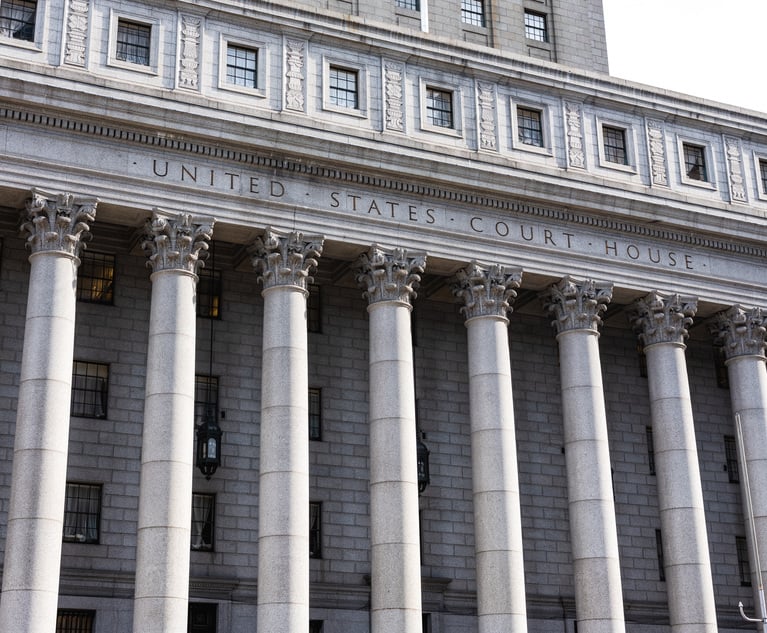Supreme Court Review: Class Action Waivers, Whistleblower Protections
During the 2017-2018 term, the U.S. Supreme Court issued several rulings that will have far-reaching implications for employers. This month's column reviews two of those key decisions.
August 02, 2018 at 01:33 PM
9 minute read
 David E. Schwartz and Risa M. Salins
David E. Schwartz and Risa M. SalinsDuring the 2017-2018 term, the U.S. Supreme Court issued several rulings that will have far-reaching implications for employers. This month's column reviews two of those key decisions. The first addresses whether companies may use class action waivers in employment arbitration agreements to restrict workers from taking joint legal action over workplace issues. The second resolves whether the anti-retaliation provision of the Dodd-Frank Wall Street Reform and Consumer Protection Act (Dodd-Frank) protects employees who report potential securities law violations internally but not to the Securities and Exchange Commission (SEC).
Class Waivers
In a monumental decision, the court in Epic Systems v. Lewis, 137 S.Ct. 809 (2017), resolved a federal appellate court split and upheld the enforceability of employment arbitration agreements containing class and collective action waivers. In a 5-4 ruling, the court held the Federal Arbitration Act (FAA) mandates the enforcement of arbitration agreements and the right to pursue class or collective relief is not protected concerted activity under Section 7 of the National Labor Relations Act (NLRA).
This issue arose in January 2012, when the National Labor Relations Board (NLRB) ruled in D.R. Horton, 357 NLRB No. 184 (2012), that employers may not use class action waivers in arbitration agreements with employees covered by the NLRA, reasoning such waivers limit employees' rights under the NLRA to engage in “concerted activities” in pursuit of “mutual aid or protection.” Most federal courts disagreed with the NLRB's reasoning, including the U.S. Court of Appeals for the Fifth Circuit, which refused to enforce the NLRB's D.R. Horton decision and again refused to enforce the board's similar ruling in Murphy Oil USA, Inc., 361 NLRB No. 72 (2014). See Murphy Oil U.S.A. v. National Labor Relations Board, 808 F.3d 1013 (5th Cir. 2015); D.R. Horton v. National Labor Relations Board, 737 F.3d 344 (5th Cir. 2013). In 2016, the Second Circuit Court of Appeals took the same view as the Fifth Circuit in Patterson v. Raymours Furniture Co., No. 15-2820 (2d Cir. Sept. 2, 2016).
However, in May 2016, the Seventh Circuit, in the Epic case, became the first federal appellate court to agree with the NLRB. See Lewis v. Epic Systems, No. 15-2997 (7th Cir. 2016) In Epic, an employee of a health care software company signed an arbitration agreement that stated “wage-and-hour claims could be brought only through individual arbitration,” and waived employees' “rights to participate in … any class, collective, or representative proceeding.” Nevertheless, the employee later brought a collective action lawsuit against his employer, alleging the company “misclassified him and his fellow technical writers” and “deprived them of overtime pay” in violation of the Fair Labor Standards Act. The company moved to dismiss and compel arbitration, maintaining the claims were subject to the arbitration agreement, but the employee argued the agreement's collective action waiver violated the NLRA and was unenforceable. The Seventh Circuit held not only that the collective action waiver was unlawful under the NLRA but, based on that illegality, the arbitration agreement also was unenforceable under the FAA's “saving clause,” which allows a court to render an arbitration agreement unenforceable on legal or equitable grounds. The Ninth Circuit followed suit in August 2016 in Ernst & Young v. Morris, No. 13-16599 (9th Cir. Aug. 22, 2016).
The Supreme Court granted certiorari and consolidated three cases to resolve the split: Epic Systems v. Lewis (Seventh Circuit), Ernst & Young v. Morris (Ninth Circuit), and NLRB v. Murphy Oil USA, (Fifth Circuit). Upholding the collective action waiver, the majority, in an opinion written by Justice Neil Gorsuch, concluded:
The policy may be debatable but the law is clear: Congress has instructed that arbitration agreements like those before us must be enforced as written. While Congress is of course always free to amend this judgment, we see nothing suggesting it did so in the NLRA—much less that it manifested a clear intention to displace the Arbitration Act.
The court began by reviewing the FAA's liberal federal policy favoring arbitration agreements and the requirement that courts rigorously enforce arbitration agreements according to their terms. The court next rejected each of the arguments asserted by the NLRB and the employees. First, it found the FAA's saving clause applies only to generally acceptable contract defenses such as fraud, duress or unconscionability, and does not “offer … refuge for defenses that … derive their meaning from the fact that an agreement to arbitrate is at issue.” Second, the court disagreed with the argument that the NLRA (1935) should be controlling since it was enacted after the FAA (1925), explaining that Section 7 of the NLRA focuses on the right to organize unions and bargain collectively and “does not even hint at a wish to displace the Arbitration Act.” Finally, the court declined to give Chevron deference to the NLRB's interpretation of the NLRA in D.R. Horton, reasoning the NLRB sought to interpret the NLRA in a way that would “limit the work of a second statute” that it does not administer.
In a forceful dissent, the minority, led by Justice Ruth Bader Ginsburg, called the decision “egregiously wrong,” asserting that “employees' right to engage in collective employment litigation and shielding that right from employer blockage are firmly rooted in the NLRA's design.” The dissent pronounced that “the inevitable result of [the Epic] decision will be the underenforcement of federal and state statutes designed to advance the well-being of vulnerable workers,” who will now “be disinclined to pursue small-value claims when confined to proceeding one-by-one.”
The Supreme Court has agreed to hear next term another arbitration agreement case, Lamps Plus v. Varela (No. 17-988), which focuses on whether class arbitration is required when the agreement uses only general language regarding arbitration. Employers who wish to prohibit class-actions through arbitration agreements should ensure their arbitration agreements are clearly worded to inform employees of the class-action waiver. In addition, implications under state laws prohibiting arbitration of certain types of claims—such as New York's new law prohibiting mandatory arbitration of sexual harassment claims (effective July 2018)—will require consideration of whether the FAA preempts state law.
Whistleblower Protections
Resolving another circuit court split, the court in Digital Realty Trust v. Paul Somers, 138 S.Ct. 767 (2018), unanimously held that to be protected by Dodd-Frank's anti-retaliation measures, employees must take their good faith allegations of securities law violations directly to the SEC. The court found the definition of “whistleblower” does not include those who only report violations through internal channels.
Section 21-F of Dodd-Frank establishes a bounty incentive program for individuals who provide information to the SEC that results in successful enforcement actions. Section 21F(a)(6) defines “whistleblower” as any person who provides “information relating to a violation of the securities laws to the [SEC].” Regulations adopted by the SEC, however, provided that for purposes of Dodd-Frank's anti-retaliation protections, “you are a whistleblower if you provide that information in a manner described in Section 21F(h)(1)(A) of the Exchange Act.” 17 C.F.R. Section 240.21F-2. Dodd-Frank's anti-retaliation provision at Section 21F(h)(1)(A) in turn protects whistleblowers if they: provide information to the SEC, initiate, testify, or assist in an investigation, judicial, or administrative action of the SEC based on such information, or make disclosures required or protected under certain federal laws, rules and regulations including the Sarbanes-Oxley Act (SOX). Notably, under SOX employees are entitled to anti-retaliation protections if they report a suspected violation either internally to their employer or externally to the government.
In Digital Realty, the plaintiff alleged his former employer retaliated against him in violation of Dodd-Frank's anti-retaliation provision by terminating his employment for making internal complaints about securities violations to senior management. The company moved to dismiss his claims, arguing the plaintiff had not reported his complaint directly to the SEC, as Dodd-Frank's definition of “whistleblower” requires. The California district court denied the company's motion to dismiss and the Ninth Circuit Court of Appeals affirmed the dismissal, finding Dodd-Frank's anti-retaliation provision protects both whistleblowers who report matters to the SEC as well as those who only make internal reports to their employer. The Ninth Circuit reasoned that applying the definition of “whistleblower” under Section 21F(a)(6) of Dodd-Frank to Dodd-Frank's anti-retaliation provision would improperly narrow protections for an individual who made disclosures protected under SOX.
The Supreme Court reversed, rejecting the interpretation of Dodd-Frank's anti-retaliatory protections established by SEC regulations and accepted by the Ninth Circuit. The court held that Dodd-Frank's plain text makes clear that the statute's anti-retaliatory protections, not just its bounty incentives, apply only to whistleblowers who report securities law violations to the SEC. The court stressed that its interpretation was consistent with the “core objective” of Dodd-Frank's whistleblower protections—“to motivate people who know of securities law violations to tell the SEC.”
Employers can expect that Digital Realty will trigger an increase in the frequency of employee reports of potential securities violations to the SEC, even in cases where the employee has reported the issue internally. This ruling, however, should not change how companies generally should respond to whistleblowers, whether or not the employer believes there has been a report to the SEC. Employers are advised to take seriously internal complaints that may point to violations of securities laws and refrain from retaliatory actions based on such complaints.
David E. Schwartz is a partner at the firm of Skadden, Arps, Slate, Meagher & Flom. Risa M. Salins is a counsel at the firm. Julian Jiggetts, a summer associate at the firm, assisted in the preparation of this article.
This content has been archived. It is available through our partners, LexisNexis® and Bloomberg Law.
To view this content, please continue to their sites.
Not a Lexis Subscriber?
Subscribe Now
Not a Bloomberg Law Subscriber?
Subscribe Now
NOT FOR REPRINT
© 2025 ALM Global, LLC, All Rights Reserved. Request academic re-use from www.copyright.com. All other uses, submit a request to [email protected]. For more information visit Asset & Logo Licensing.
You Might Like
View All
Decision of the Day: Qui Tam Relators Do Not Plausibly Claim Firm Avoided Tax Obligations Through Visa Applications, Circuit Finds

'Serious Legal Errors'?: Rival League May Appeal Following Dismissal of Soccer Antitrust Case
6 minute read
Decision of the Day: Judge Sanctions Attorney for 'Frivolously' Claiming All Nine Personal Injury Categories in Motor Vehicle Case

Trending Stories
- 1Recent Controversial Decision and Insurance Law May Mitigate Exposure for Companies Subject to False Claims Act Lawsuits
- 2Visa Revocation and Removal: Can the New Administration Remove Foreign Nationals for Past Advocacy?
- 3Your Communications Are Not Secure! What Legal Professionals Need to Know
- 4Legal Leaders Need To Create A High-Trust Culture
- 5There's a New Chief Judge in Town: Meet the Top Miami Jurist
Who Got The Work
J. Brugh Lower of Gibbons has entered an appearance for industrial equipment supplier Devco Corporation in a pending trademark infringement lawsuit. The suit, accusing the defendant of selling knock-off Graco products, was filed Dec. 18 in New Jersey District Court by Rivkin Radler on behalf of Graco Inc. and Graco Minnesota. The case, assigned to U.S. District Judge Zahid N. Quraishi, is 3:24-cv-11294, Graco Inc. et al v. Devco Corporation.
Who Got The Work
Rebecca Maller-Stein and Kent A. Yalowitz of Arnold & Porter Kaye Scholer have entered their appearances for Hanaco Venture Capital and its executives, Lior Prosor and David Frankel, in a pending securities lawsuit. The action, filed on Dec. 24 in New York Southern District Court by Zell, Aron & Co. on behalf of Goldeneye Advisors, accuses the defendants of negligently and fraudulently managing the plaintiff's $1 million investment. The case, assigned to U.S. District Judge Vernon S. Broderick, is 1:24-cv-09918, Goldeneye Advisors, LLC v. Hanaco Venture Capital, Ltd. et al.
Who Got The Work
Attorneys from A&O Shearman has stepped in as defense counsel for Toronto-Dominion Bank and other defendants in a pending securities class action. The suit, filed Dec. 11 in New York Southern District Court by Bleichmar Fonti & Auld, accuses the defendants of concealing the bank's 'pervasive' deficiencies in regards to its compliance with the Bank Secrecy Act and the quality of its anti-money laundering controls. The case, assigned to U.S. District Judge Arun Subramanian, is 1:24-cv-09445, Gonzalez v. The Toronto-Dominion Bank et al.
Who Got The Work
Crown Castle International, a Pennsylvania company providing shared communications infrastructure, has turned to Luke D. Wolf of Gordon Rees Scully Mansukhani to fend off a pending breach-of-contract lawsuit. The court action, filed Nov. 25 in Michigan Eastern District Court by Hooper Hathaway PC on behalf of The Town Residences LLC, accuses Crown Castle of failing to transfer approximately $30,000 in utility payments from T-Mobile in breach of a roof-top lease and assignment agreement. The case, assigned to U.S. District Judge Susan K. Declercq, is 2:24-cv-13131, The Town Residences LLC v. T-Mobile US, Inc. et al.
Who Got The Work
Wilfred P. Coronato and Daniel M. Schwartz of McCarter & English have stepped in as defense counsel to Electrolux Home Products Inc. in a pending product liability lawsuit. The court action, filed Nov. 26 in New York Eastern District Court by Poulos Lopiccolo PC and Nagel Rice LLP on behalf of David Stern, alleges that the defendant's refrigerators’ drawers and shelving repeatedly break and fall apart within months after purchase. The case, assigned to U.S. District Judge Joan M. Azrack, is 2:24-cv-08204, Stern v. Electrolux Home Products, Inc.
Featured Firms
Law Offices of Gary Martin Hays & Associates, P.C.
(470) 294-1674
Law Offices of Mark E. Salomone
(857) 444-6468
Smith & Hassler
(713) 739-1250






